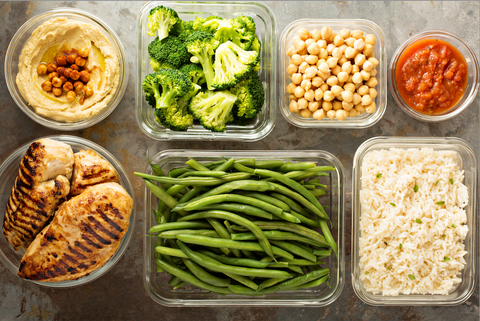While diet plays a fundamental role in our physical health, more and more studies are looking at its role in our mental health. In a context where the pandemic has caused a significant increase in mental health problems such as anxiety and depression, combined with a time of year when seasonal depression is particularly present, putting sunshine on your plate is more relevant than ever!
Did you know that over the course of a year, one in five people in Canada will personally experience a mental health problem or illness?
While there is no single food that can treat mental health issues, studies show that eating the right diet can help soothe some symptoms and improve our overall well-being.
This is no surprise: our body and our mind are linked. The way we nourish our bodies has significant impacts on our mental health. Here are some tips and food ideas that will help you optimize your mental health.
Ultra-processed foods and added sugars
Most of the time, ultra-processed foods have very low nutritional qualities. They are defined as industrial preparations of food-derived substances and additives that contain little or no whole food. Compared to other food groups, these products typically include twice the calories, three times the free sugars and twice the sodium. This type of food contains much less vitamins, minerals, protein and fiber.
According to a 2017 study by the Heart and Stroke Foundation, nearly half of the calories consumed by Canadians come from ultra-processed foods like sugary cereals, cakes, candies and sugary drinks.
As a result, there is growing evidence that diets high in ultra-processed foods and sugars are associated with an increased risk of mental disorders, such as depression and anxiety. Even when consumed in small quantities, this type of diet increases the risk of mood problems. Our reactions and feelings are disrupted when we eat too many of these bad foods. This can lead to a lack of important neurotransmitters that impact emotion regulation and an overproduction of other neurotransmitters that impact stress.
The brain, the most greedy organ
On the other hand, adequate intake of certain nutrients, such as omega-3 fatty acids, B vitamins and vitamin D, has been shown to prevent mental health problems. Consumption of these nutrients contributes to the proper functioning of the brain, promotes positive emotions, increases coping skills and improves self-esteem and overall quality of life.
When we were young, we learned that eating helps strengthen bones and muscles, but in reality our brain is the most active and greedy organ in our body. Our brain only weighs 2% of our weight and, yet, between 20 and 50% of the nutrients absorbed are used to nourish it. It is therefore essential to consume foods that promote the functioning of our brain.
To do this, we must include in our diet a wide variety of colorful fruits and vegetables, whole grains, nuts and seeds, protein sources such as fish, chicken, legumes, tofu and yogurt. . We also need to limit our consumption of processed foods like takeout, most packaged convenience foods, as well as foods with added sugars and refined flours. We're talking here about products like juices, flavored yogurts, sugary cereals, pastries, as well as white breads and pastas made from white flour.
Why is protein so important?
We all know that proteins are essential for our body. These help with muscle development and repair, as well as energy production.
What you may not know is that protein is also vital for our mental health. Amino acids are the building blocks of proteins. This means that when you eat protein, it also provides you with amino acids. Many neurotransmitters essential for brain function and mental health are also made of amino acids. For example, dopamine is made from the amino acid tyrosine. A lack of dopamine is associated with aggression and bad mood. Additionally, according to the Heart and Stroke Foundation of Canada, since neurotransmitters are the substance that transfer signals in the brain, if you don't eat enough protein, your memory and mental agility can suffer. .
The intestinal flora
Happiness neurotransmitters like serotonin and dopamine are mainly produced in the gut. Indeed, serotonin (brain neurotransmitter which participates in mood regulation) is strongly linked to the intestine. Only 5% of the body's serotonin is produced in the brain. The remaining 95% is stored and active in the intestine. All of these neurotransmitters are closely linked to the billions of “good” bacteria that make up our intestinal microbiota, also called intestinal flora.
These bacteria help limit inflammation, play a role in immunity and nutrient absorption, and activate neural pathways that connect the gut to the brain. This is why the intestine is sometimes called the “2nd brain”.
Recent studies also suggest that our gut microbiota could also have positive effects on the prevention and treatment of depression and influence fundamental aspects of behavior, such as stress management and social interactions. There's a reason why stress can trigger feelings of anxiety in the mind, in addition to stomach aches.
To maintain our gut health, we must increase our consumption of foods that promote digestive health, such as foods rich in prebiotics and probiotics. Prebiotic foods, such as asparagus, bananas, garlic and onion, are rich in fiber and feed the good bacteria in our gut. Probiotic foods include yogurt, kefir, sauerkraut and kombucha.
A grocery list that benefits mental health
Vitamin C
In fruits and vegetables, such as tomatoes, peppers, broccoli, citrus fruits and berries.
Vitamin E
In walnuts, almonds, sunflower seeds, hazelnuts, peanuts and wheat germ.
Beta carotene
In dark green and orange vegetables, such as spinach, kale, carrots, butternut squash, and sweet potatoes.
B vitamins
In whole grains, meat, poultry, eggs, legumes (lentils, black beans, kidney beans), leafy greens and fortified cereals.
Vitamin D
In fortified milk, fatty fish and egg yolks.
Zinc
In shellfish, legumes, seeds, nuts, dairy products, eggs, whole grains and dark chocolate.
Iron
In red meats, poultry, oysters, legumes, leafy greens, quinoa, pumpkin seeds, fortified cereals and dark chocolate too.
Omega-3 fatty acids
In fatty fish and seafood, flax and chia seeds, canola oil, walnuts, white beans and soy
In summary, several foods are beneficial to our mental health. It is relevant to know which ones suit you best and gradually change your diet towards one that is healthy for your body and mind.
It is now possible to say that the famous phrase “We are what we eat” does not only apply to our physical health, but also to our mental health!
Sources used for writing this article:
CMHA. (July 19, 2021). Fast Facts about Mental Health and Mental Illness. Canadian Mental Health Association. https://cmha.ca/brochure/fast-facts-about-mental-illness/
Garnier, E. (August 25, 2015). Nutrition and psychiatry - Is mental health partly on the plate? , The Quebec doctor, https://lemedecinduquebec.org/archives/2015/9/nutrition-et-psychiatrie-la-sante-mentale-serait-elle-en-partie-dans-l-assiette/ .
Hatton, P. (December 7, 2020). Nourish your brain well to feel better . Government of Canada. https://www.canada.ca/fr/ministere-defense-nationale/feuille-derable/defense/2020/12/bien-nourrir-cerveau-mieux-se-sentir.html .
Manulife. (2020). Improve your well-being by adding protein-rich foods to your diet. Manulife. https://www.manulife.ca/individuals/plan-and-learn/healthy-lifestyle/nutrition/2022/add-protein-rich-foods-to-your-diet- for-a-better-health.html .
Mubarak, JC. (December 5, 2017). Far too many ultra-processed foods on Canadians' plates. Radio-Canada, https://ici.radio-canada.ca/nouvelle/1071290/canadiens-aliments-ultra-transformes-rapport-moubarac .
Psychomedia. (January 29, 2022). 7 Types of Foods That Can Help Improve Mood and Mental Health . Psychomedia. http://www.psychomedia.qc.ca/sante/2022-01-29/alimentation-humour-depression-sante-mentale .
Tardieu, A. (May 31, 2021). Diet to tackle mental health disorders . Radio-Canada. https://ici.radio-canada.ca/nouvelle/1796680/alimentation-regime-sante-mentale-depression .
Wilton, M. (January 24, 2022). How to optimize your mental health through diet. Telus. https://www.telus.com/fr/health/care-centres/blog/how-to-help-optimize-your-mental-health-through-food .






Comments (0)
There are no comments for this article. Be the first to leave a message !